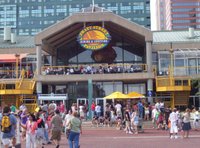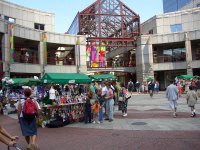Kicking my ideas in the ass
"Here is a characteristically modern definitition of the public square: a place of passive enjoyment, a kind of playground for adults, and it says a good deal about how slack our current definition of community can be. [Many urban theorists] are content to describe the public square strictly in terms of gregariousness: how it offers a spatial experience shared by a heterogeneous public which will sooner or later go its separate ways; an urban form which acts to draw people together and give them a momentary pleasure and sense of well-being. No one should underestimate those benefits but in the political landscape the public square serves an entirely different purpose. It is assumed that those who were come there are already aware that they are members of the community, responsible citizens, and that on occasion they will participate in public discussions and take action on behalf of the community...

The most popular, frequented plazas and small parks are those which [sociologist William Whyte] says provide an agreeable microclimate, easy accessibility, some sensational object like a piece of sculpture or a display of flaming water, and which (and this is most essential) allow people to sit comfortably and relax. 'What attracts people most...are other people.' But what does 'other people' mean? Those with whom (to use Aristotle's phrase) we exchange moral and noble ideas? No: 'other people' more often than not in this new urban space seems to mean voices and color and movement and fleeting impressions. People have become elements of animation in a pleasantly planned environment, and we are social beings merely to the extent that we want to be 'at one' with that particular environment.
These contemporary urban parks...are the last, poor remnants of what was once an almost sacred space, but in our rejection of their political function we presage not the end of civilization but the end of one chapter. We are better off than we suppose."
--J.B. Jackson
Ouch. Flipping through my notebook I found this passage, which I'd copied out almost exactly a year ago. It's sobering to see that my ideas about public space haven't changed much since then (see my posts on the Zocalo and indirectly on murals and Mark Morris), and that Jackson years ago was taking those ideas apart. The kicker? What does he mean, after all of that careful dissection of what he sees as an ahistorical and impoverished vision of public space, when he writes "We are better off than we suppose?"
A public space in which we exchange ideas. In whatever form that space or those ideas might take. That's my new project.


0 Comments:
Post a Comment
<< Home